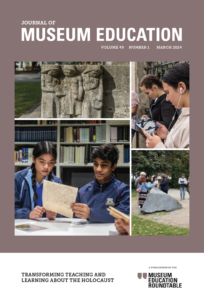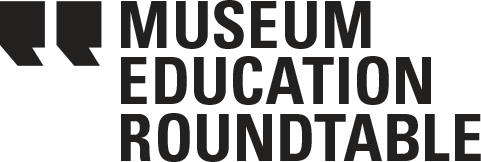Let’s Discuss: Transforming Teaching and Learning about the Holocaust
 The Journal of Museum Educations issue 49.1, Transforming Teaching and Learning about the Holocaust, shares how museum educators are engaging with the stories and lessons of the Holocaust and how those stories are relevant in different ways today. Both the MER Board and Guest Editor Wolfgang Schmutz have provided context for this issue, and through this suggested dialogue guide, we hope that you will explore these articles within your own context.
The Journal of Museum Educations issue 49.1, Transforming Teaching and Learning about the Holocaust, shares how museum educators are engaging with the stories and lessons of the Holocaust and how those stories are relevant in different ways today. Both the MER Board and Guest Editor Wolfgang Schmutz have provided context for this issue, and through this suggested dialogue guide, we hope that you will explore these articles within your own context.
Need support in creating a brave space for dialogue? Use these resources to help frame the conversation:
- https://www.sitesofconscience.org/wp-content/uploads/2020/01/Sites-of-Conscience-Dialogue-Facilitation-and-Resources.pdf
- https://cft.vanderbilt.edu/guides-sub-pages/difficult-dialogues/
- https://www.learningforjustice.org/magazine/publications/lets-talk
- https://www.learningforjustice.org/magazine/understanding-and-countering-antisemitism-and-islamophobia-in-schools
- https://www.museumaction.org/resources/
You can access the issue online through our publishing partner Taylor & Francis’s Journal of Museum Education web page.
Dialogue Questions
- In this issue, museum educators grapple with how specific or universal to apply the lessons of the Holocaust when looking at other genocides. What are the limits and possibilities when using the Holocaust to think about other genocides?
- In what ways are the museums and institutions we work for complicit in genocide and structural violence? How do you grapple with this legacy at your own institution?
- Does addressing antisemitism play a role in how you facilitate learning about the Holocaust? Are antisemitism and other forms of racism and prejudice addressed equally or differently in your practice? Why?
- What do the learners we work with every day want/need or bring to the table (as an asset) when discussing instances of genocide, including the Holocaust?
- As educators, what should guide our decision about when to focus on the specifics of any historical atrocity, and when to guide participants toward general ideas, wider contexts, or ethical principles?
- Do the events unfolding in our current moment change your perspective on this issue or create new questions that museums need to contend with?
- Reflections spurred by conflict in our time can be deeply personal. How do your own background and personal commitments influence your museum education work? When, if ever, would you separate your personal and professional practice? When is it important to connect them?

